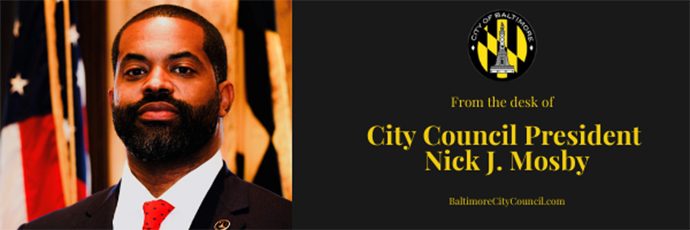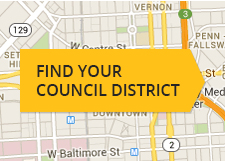Addressing vacant properties in the city we love

Dear Baltimore,
Last month, I shared with you that I sent a letter to the Mayor outlining the Council's 30-day goals for #HouseBaltimore.That deadline to respond to Mayor Scott’s request to address vacant housing has been met with our greatest effort to introduce and pass substantive policy as the prescription to one of our city’s oldest and most rooted ills.
Still, our commitment to #HouseBaltimore began before this 30-day directive and will continue as my office meets with Councilmembers and the community to address any outstanding concerns. Meetings have been scheduled, however, do not hesitate to reach out to me or my staff with additional amendments, questions or concerns. Too many of our communities and residents have dealt with the toughest of times, tougher than our fight for #HouseBaltimore, so it is our duty to continue pressing forward. The goal of #HouseBaltimore has consistently been to ensure residents have the chance to buy a house they can afford, live in and use to ultimately create generational wealth for their families. We understand and know that it will also help to eliminate many of the vacant houses that currently plague neighborhoods throughout Baltimore City: 3,000 of which are City-owned.
Again, I want to thank Vice President Middleton and Councilmember Bullock for rolling up their sleeves and working hard to show the innovative possibilities of what this Council can do for our residents.
Today, in furtherance of this same commitment, I will be introducing three new bills that I hope garner your support. We understand and know that vacant properties pose a serious threat to residents' public health and safety. Addressing vacant properties in this city we love will require a multi-tiered approach, starting with holding vacant property owners accountable. These three bills are aimed at holding owners of vacant properties accountable for complying with the City’s codes, responding to code violations and using City services.
- Vacant Structures – Emergency Response Fees
- Requires vacant property owners to pay for emergency response services provided by the Baltimore City Fire Department. It allows the City’s Fire Department to recoup costs spent on fire investigations, incidents involving hazardous materials, water incidents, and other incidents requiring fire personnel. It also allows the Department to bill property owners based on itemized costs of materials used after responding to an emergency service at their property.
- Vacant Structures – Registration Fees and Penalties
- Strengthens the City’s current vacant registration process by incentivizing vacant property owners to address outstanding code violations and work towards deregistering their property as a vacant.
- Vacant Structures – 3-1-1 Complaint Fines
- Incentivizes vacant property owners to address multiple complaints about their properties by establishing a fee structure for repeated substantiated 3-1-1 service requests to vacant properties
Lack of access to affordable housing sits at the core of many of our city’s greatest challenges, and our pledge to #HouseBaltimore includes tackling this issue from varied angles.
Check out the article posted today on WYPR sharing more information about these new bills.
Many of our colleagues will also be introducing legislation to address vacants on Monday and I look forward to a robust and thorough discussion over the next few months as we continue to show Baltimore our love and support through our legislative priorities.
In service,

Nick J. Mosby
City Council President
CONTACT
Candance Greene
Deputy Director of Communications
Office of City Council President Nick J. Mosby
443-602-5346
candance.greene@baltimorecity.gov

